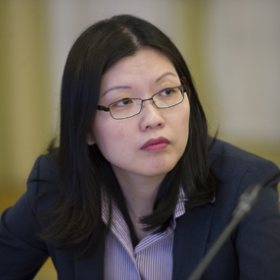
Piin-Fen Kok Discusses U.S.-China Cooperation
EWI's director of China, East Asia and the United States Piin-Fen Kok talked to People's Daily China about the growing possibilities for cooperation between the U.S. and China.
Translation by Andi Zhou and Cathy Zhu. Read the original article in Chinese here.
New York—U.S. President Barack Obama will conduct a state visit to China in November to participate in the Asia-Pacific Economic Cooperation (APEC) Leaders Meeting. People’s Daily reporter Li Bingxin recently interviewed Piin-Fen Kok, director of the China, East Asia and United States program at the EastWest Institute, about the status of U.S-China relations. Kok argued that the two powers have an opportunity to develop broad cooperation in several key areas.
Strategic trust promotes regional cooperation
Kok stated that China and the U.S. must first build strategic trust in order to develop cooperation in a number of areas. In recent years, China has been suspicious of the U.S. “pivot” towards Asia, and the two U.S. initiatives of strategic rebalancing in the Asia-Pacific and the Trans-Pacific Partnership (TPP). China views these policies as methods to contain China’s rise. On the other hand, the U.S. sees China as taking an assertive stance on its maritime disputes, especially through military activity seemingly aimed toward U.S. allies. This aggression, coupled with recent unusually close encounters between U.S. and Chinese military planes, has left the U.S. unable to decipher China’s intentions. Despite the latter’s proposal for a new major-power relationship without conflict and confrontation, China’s behavior is perceived by the U.S. as raising the risk of conflict. Kok suggests that if the two countries can sit down for honest discussions and agree that the parties are not engaged in a zero-sum game and that peaceful cooperation can clear confusions about the other’s true intentions, then the two powers could reach consensus on a number of issues. After all, the U.S. has affirmed that it has no intention to contain China, and China has declared it will not push the U.S. out of the Asia-Pacific region. From this foundation, the two sides could cooperate on a common strategic vision for the Asia-Pacific, and honestly raise their respective concerns. There is a wide range of issues the U.S. and China can work together to address, such as the North Korea nuclear issue, climate change, counter-terrorism and infectious disease control and prevention. Their recent collaboration in training young Afghan diplomats was a good start, and demonstrated that the two sides can find common ground about how to solve bilateral and regional problems. If both sides can maintain that spirit to establish mutual trust, it would be a blessing for the people of Asia, and the Pacific will become more peaceful.
The rule of law benefits economic cooperation
At the Fourth Plenary Session of the 18th Party Congress, the Chinese Communist Party committed to improving rule of law. This would help attract U.S. investment and contribute to further economic cooperation. In order to accomplish this, the central and local governments have to be consistent in enforcing laws. When China joined the WTO, it committed to implementing policies in line with international rules––such as protecting intellectual property rights––but the key is in uniform enforcement. The central government has established relevant laws and regulations, but they are not always enforced at the local levels. U.S. companies are also concerned about the issue of national treatment in China due to what they view as attempts to target foreign companies. Chinese investments in the U.S. have also faced some setbacks in cases where the U.S. has chosen to protect domestic industries and workers, often in response to the 2009 recession. Both sides have similar issues. China will only be able to solve its problems if it consistently applies the rule of law from top to bottom. The American federal system means states have different laws, priorities and needs when it comes to attracting Chinese investment, and thus several layers of complexity. In short, strengthening the rule of law should be among both countries’ goals—strict enforcement of regulations would encourage foreign investors to invest boldly and confidently, contributing to an all-around increase in economic cooperation.
Political exchanges help cooperation on governance
Kok further remarked that due to differences in the political systems of the U.S. and China, and the absence of organizations focused on promoting exchanges between the U.S.’s political parties, there has been a lack of understanding between Chinese and American political parties for a long time. In 2010, the EastWest Institute’s late president John Edwin Mroz personally opened up a channel for exchanges between the two powers’ political parties, allowing the major parties from both countries to meet face-to-face to discuss their experience in party governance, national governance, military affairs and security issues. The Chinese Communist Party is the ruling party in China, while the U.S. has been governed by both the Democratic and Republican parties, so it is important for both the current and future ruling parties to increase dialogue. Additionally, Mroz worked to increase Chinese understanding of the intricacies of American state politics, for instance, the fact that state governors do not all come from the same party. Mroz passed away from illness in August this year, but Kok emphasized that exchanges between the two countries’ political parties would likely continue to improve

